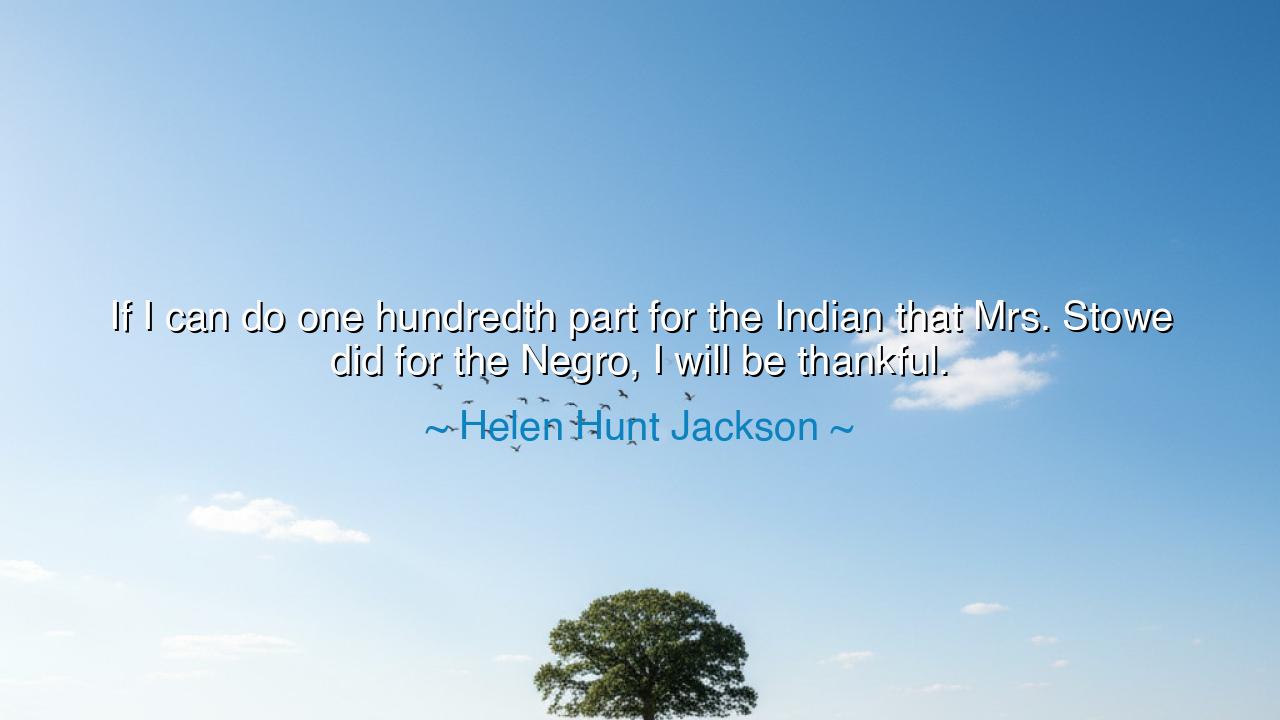
If I can do one hundredth part for the Indian that Mrs. Stowe
If I can do one hundredth part for the Indian that Mrs. Stowe did for the Negro, I will be thankful.






When Helen Hunt Jackson proclaimed, “If I can do one hundredth part for the Indian that Mrs. Stowe did for the Negro, I will be thankful,” she spoke as one aflame with righteous purpose, a woman who understood the power of words to pierce injustice and awaken compassion. Her words were not born of idle thought, but of the fire of conscience. She looked upon the suffering of the Native American peoples in the nineteenth century, stripped of their lands, betrayed by treaties, and forced into exile, and she longed to give them a voice before a nation that had chosen blindness. Her gratitude would not be for wealth or comfort, but for the chance to serve, even in the smallest measure, in the cause of justice.
The origin of her reflection lies in the towering influence of Harriet Beecher Stowe, whose novel Uncle Tom’s Cabin shook the conscience of a nation and fueled the abolitionist movement. Stowe’s pen became a weapon sharper than the sword, arousing sympathy for enslaved African Americans and exposing the brutality of slavery to the eyes of the world. Jackson, witnessing the plight of the Native peoples, measured herself against Stowe’s legacy, and with humility declared that if she could accomplish even “a hundredth part” of that great work, her life would not be in vain. Thus, her thankfulness was rooted not in self-achievement, but in the possibility of advancing justice for the voiceless.
History provides proof of her resolve. Jackson poured her life into advocacy, writing A Century of Dishonor (1881), a searing indictment of U.S. government policies toward Native Americans. She sent a copy to every member of Congress, demanding they confront the shame of broken promises and cruelty. Later, through her novel Ramona, she sought to stir the hearts of ordinary Americans, weaving truth into story, much as Stowe had done. Though her works did not achieve the sweeping political transformation she yearned for, they remain a testament to her courage, a voice crying out in a wilderness of apathy.
Her words remind us of the power of humility in service. She did not claim she could equal Stowe; she did not boast of her abilities or exaggerate her influence. Instead, she confessed her hope to do even a fraction of such good. This humility does not weaken her purpose; rather, it strengthens it, for she understood that greatness lies not in claiming glory but in faithfully serving one’s calling, however small the impact may seem. Gratitude flows from the recognition that even the smallest seed of justice may grow into a tree whose shade blesses generations.
Her declaration also teaches us about the sacred duty of empathy. She, a woman of privilege, did not close her eyes to the suffering of those deemed outsiders in her society. Instead, she chose to use her voice on their behalf, knowing that silence would make her complicit in their oppression. Her thankfulness was bound not to her own comfort but to her ability to align her life with truth and justice. This lesson is eternal: that the measure of our lives is not how much we keep for ourselves, but how much we give for the sake of others.
The lesson for us is clear: you need not change the whole world to live a life of meaning. If you can do even a hundredth part of good, if you can stand for even one who has no defender, if you can raise your voice against even one injustice, then your life is rich with purpose. The scale of impact matters less than the faithfulness of action. As Jackson taught, gratitude flows not from achieving all things, but from doing your part with courage and integrity.
Practical wisdom follows. Ask yourself: who in my world suffers unseen, unheard, unprotected? What gift, what talent, what voice has been placed in my hands that might speak for them? Do not measure yourself against the giants of history with envy or despair; instead, be thankful if you can serve even in a small way. Write, speak, act, comfort, resist—whatever your hand finds to do, do it with justice and mercy.
Thus, in the words of Helen Hunt Jackson, we are reminded that the truest gratitude is born from service, and that the smallest act of justice is a treasure greater than comfort or fame. Let us then live so that we too may say: if we have done even a fragment of good for the suffering, we will be thankful, for that is enough to mark our lives with honor before God and before history.






AAdministratorAdministrator
Welcome, honored guests. Please leave a comment, we will respond soon